The primary objectives of the stowage requirement for cargo handling operations is to:
- Ensure safety of all personnel engaged in the activity
- Expedite discharge for better efficiency, higher productivity and quicker turn-around
- Avoid damage to the cargo
The stowage requirements are applicable for vessels calling at both Jurong Port and Sembawang Wharves.
The stowage requirements will be implemented with effect from 16 May 2022.
All vessels carrying steel cargoes berthing at Jurong Port and Sembawang Wharves after 16 May 2022, 0000hrs shall comply with the stowage requirements.
Carriers / Owners / Principal
Responsible for the stowage and lashing condition of the cargoes.
Consignee
Responsible for the quality and quantity of the dunnage and bundling condition of the cargoes.
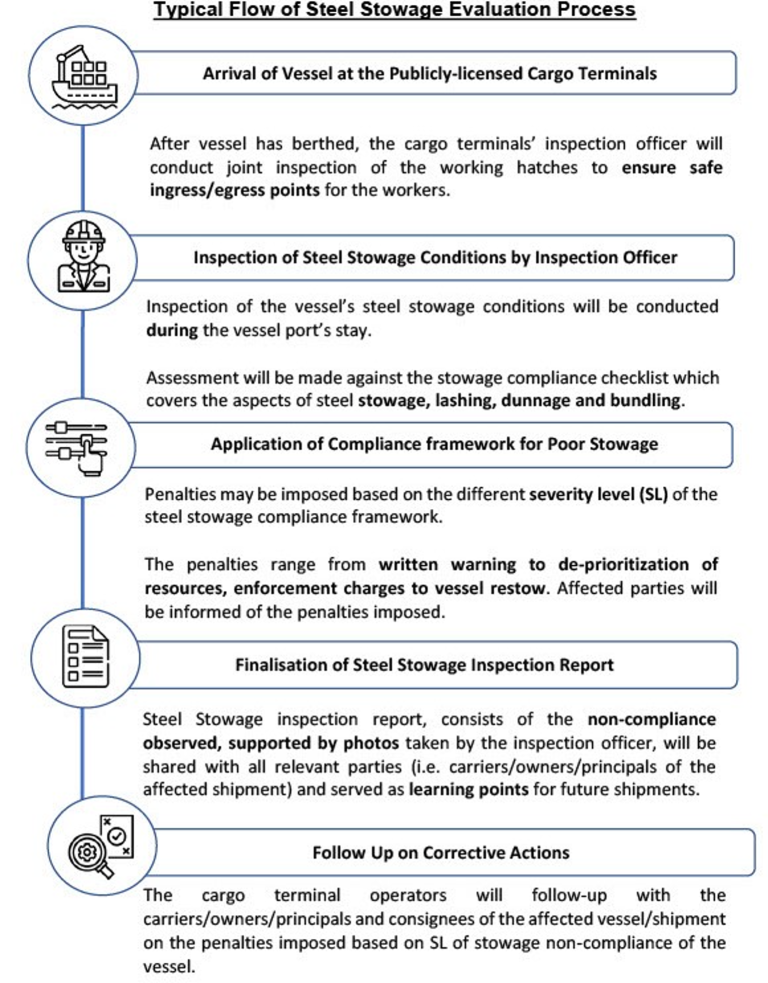
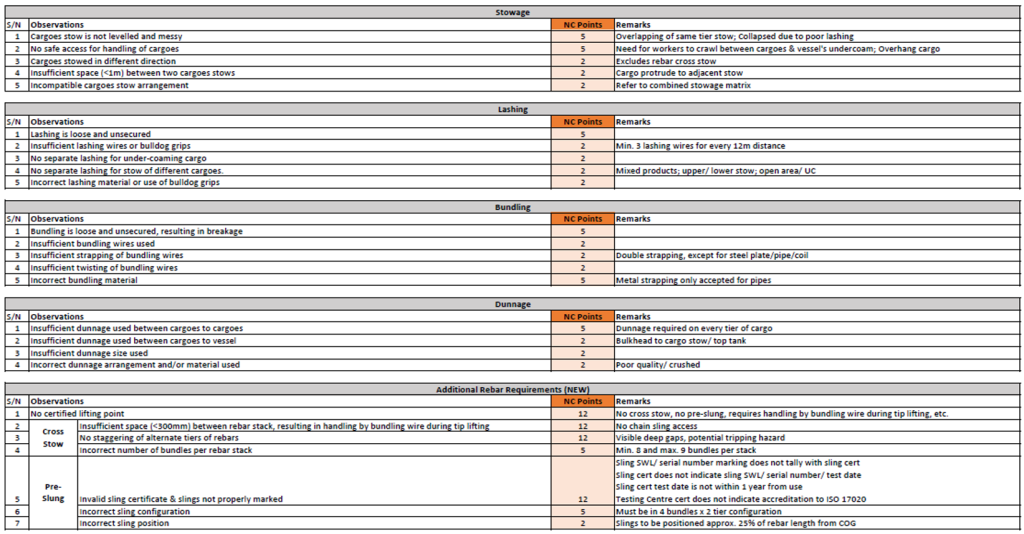
The Inspection Officer will conduct assessments of the stowage condition before the start and throughout the operations to determine the condition of the stowage.
Assessment will be made against the stowage non-compliance (NC) checklist which covers the aspects of steel stowage, lashing, dunnage and bundling. NC points will be given to each non-compliance observed.
Please click here to download the Non-Compliance Checklist.
The non-compliance (NC) points given throughout the vessel’s port stay will be used to determine the severity level (SL) of the stowage.
Carriers/owners/principal are responsible for stowage and lashing. Consignees are responsible for dunnage and bundling.
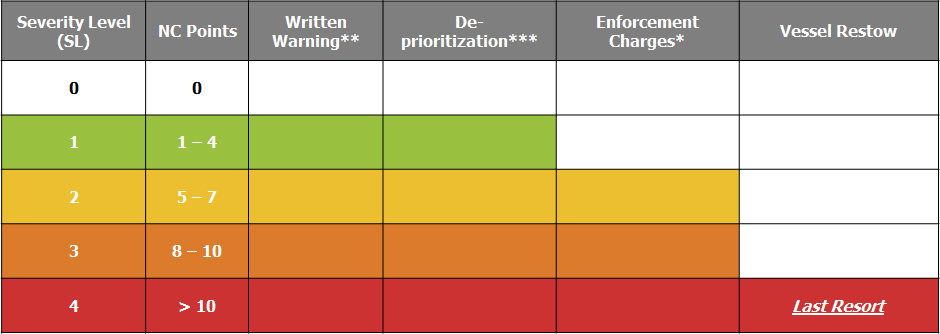
(1) Written letter with non-compliance report to respective parties. Repeated recurrences will be subject to heavier penalties.
(2) Stevedoring and berth resources to be de-prioritized for poor stowage vessels, especially during bunching situations.
(3) Enforcement to be imposed to consignee & Carrier/ Owner/ principal (through represented agents). The charges are dependent on the severity of the poor stowage.
(4) For poor stowage vessels that poses significant safety concerns. Vessel will be turned away to restow before being allowed to enter the port.
The enforcement charges is a fixed quantum based on i) severity level (SL) of stowage non-compliance and ii) tonnage handled at the Port.
It will be applied to the carriers/owners/principal and consignees, based on their respective SLs.
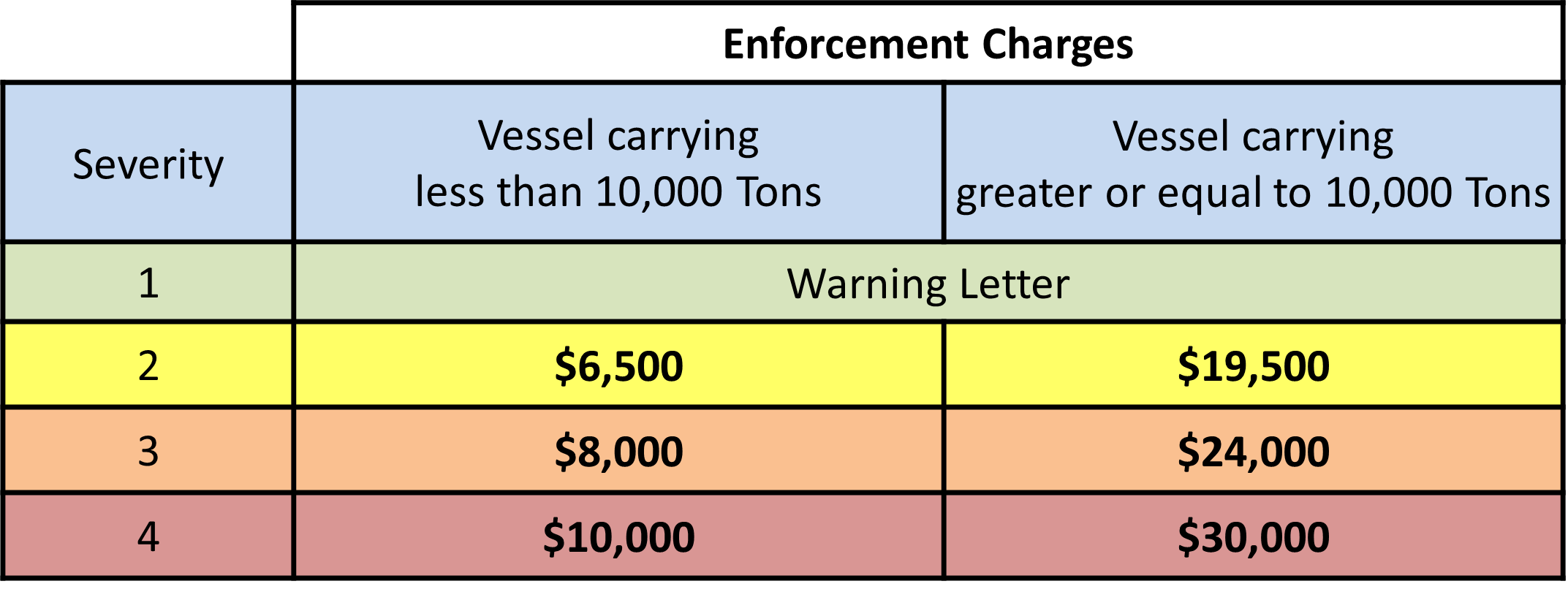
The applicable enforcement charges will be pro-rated (based on tonnage split).
For example, a shipment of 20,000 tons of steel product has severity level 3 of poor stowage due to dunnage and bundling. The applicable enforcement charge is S$24,000.
The shipment for three consignees with tonnage split of 10K, 6K and 4K. The consignees will then have S$12K, S$7.2K and S$4.8K of enforcement charges, respectively. For customers eligible for the enforcement charges but without an account with Jurong Port, they or their appointed delivery parties may have to pay the charges before any cargo is brought into or out of Jurong Port.
The stowage requirements apply at both terminals
For the punitive actions, it will be assessed and applied by the terminals separately
The applicable enforcement changes will be pro-rated (based on tonnage split) and collected by both terminals
The guidelines aim to address the various operational and safety challenges experienced by the Ports, particularly poor and unsafe stowage.
For details, please download the following files:
| File Name | Description | |
| 1 | Stowage Guidelines_Summary | Summarised description of the stowage guideline |
| 2 | No. 49A of 2019 – Best Practice Guidelines For Stowage And Securing of Steel Cargo | Detailed Stowage Guidelines (Part 1) – Rebars, WRIC, Steel Plates, Pipe |
| 3 | No. 49B of 2019 – Best Practice Guidelines For Stowage And Securing of Steel Cargo | Detailed Stowage Guidelines (Part 2) – Pipe, Structural Steel, Coils, Ingots, Billets, Blooms, Slabs, Combined Steel Products |
| 4 | No. 64 of 2019 – Best Practice Guidelines For Stowage And Securing of Steel Cargo | Summary of Stowage Guidelines |
| 5 | No. 66 of 2022 – Addendum 01 to 2018 Best Practice Guidelines For Stowage And Securing of Steel Cargo | Detailed Stowage Guidelines (Addendum 01) – Pipes, Structural Steel, Combined Stowage & Rebar |
| 6 | No. 42 of 2023 – Addendum 02 to 2018 Best Practice Guidelines For Stowage And Securing of Steel Cargo | Detailed Stowage Guidelines (Addendum 02) – Rebar Preslung / Cross Stow Recommendations & WRIC Excerpts |
